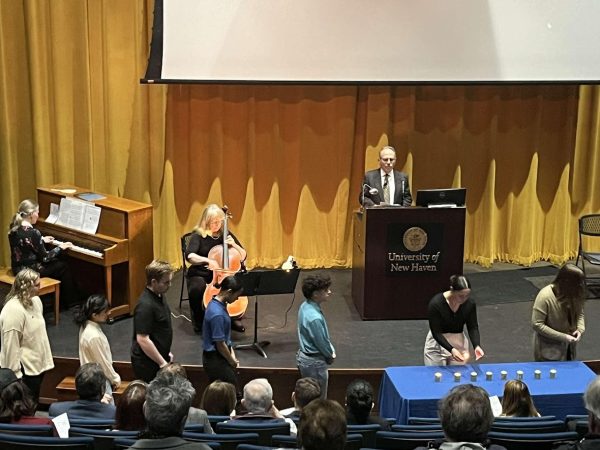USGA funding allocations: What you need to know about budgeting procedures
One large component of student life on campus surrounds the activity of student-run organizations, and when it comes to budgeting, students may feel out of the loop. Many may wonder how the Undergraduate Student Government Association (USGA) at the University of New Haven decides how funding is distributed to Recognized Student Organizations (RSOs). Never fear, as the budget season approaches, we’ve uncovered the process.
“Finances can be confusing for students,” said USGA president, Cora Cogill. Cogill began serving as interim president after the previous president stepped down.
During the fall semester, she was the USGA vice president of operations (VPOPS), overseeing the senate population. Prior to this, she herself was a senator for two years. On Feb. 26, she stepped into the presidential role.
Cogill’s new role includes overseeing all positions including the two in charge of finances: vice president of finance and the director of finance.
“Finance is an integral part of USGA,” said Cogill. “And this is why there are two positions dedicated to finances. It is also why we have a budget committee to gain student input when it comes to the allocations of finances to RSOs.”
The vice president of finance position is filled by Ella Galvan and the director of finance position is held by Secora Chambers. Both roles are involved in the process of funding RSOs via two methods: the “average method” and the “line by line method.”
The “average method” is where students in an RSO request the average money spent in past years. This was previously the average of past money granted, but the USGA constitution has been amended for the spring 2023 semester. The “line by line method” is when students itemize each of their expenses and request money based on that. The budget committee plays an important role in the line by line method.
The USGA budget committee is composed of at least six members of the legislature. Among their duties are setting standards and penalties in regards to line by line requests.
“For example, t-shirts… budget committee makes a standard price,” said Chambers. “So, let’s say they decide $15 for club shirts. Now people know what they’re allowed to ask for and how much. It’s basically just so it’s reasonable.”
After these standards and penalties are decided upon, all USGA members vote on whether these standards should be put into action.
The budget committee is also responsible for holding hearings for miscellaneous requests. Organizations can request money from miscellaneous funds if they want to hold an event or activity for which they do not currently have the funding. Money can also be requested for new organizations that become official RSOs during the semester and could not participate in the previous year’s budget process. Miscellaneous funds include rollover money from the previous year.
If an RSO requests less than $5,000, the budget committee decides whether the request should be granted after the hearing. If the request is more than $5,000, the budget committee considers the suggestion, convenes and recommends a reasonable financial request for USGA to approve, deny or adjust the funding. Because it is such a large amount of money, USGA members vote to grant or deny the request. .
For example, if say Active Minds, an RSO that promotes mental health awareness, education and advocacy, requested $5,010 for an event planned in the fall semester, the budget committee would review the request. If the committee were to agree that only $5,000 should be allotted for the event, they would then recommend that $5,000 should be given to Active Minds at the next USGA meeting. Then, members of USGA would vote on approving or denying the request.
USGA members say they understand that the budgeting process can be confusing and recommend students to practice. All executive board members are eager to help and give advice for those seeking guidance during budget season.
“I think it’s fully just based off of practice,” said Galvan. “I was a treasurer before this and did a lot of Charger Connect stuff previously. I just think it’s just practice and experience. I also think people are intimidated. But we’re here to help.”
“I would be willing for them to put in a practice purchase request or practice P.O. [purchase order]. As long as they tell me to delete it… no harm, no foul,” Galvan said.
Training sessions on how to submit RSO yearly budgets for the 2023-2024 academic year will be held Tuesday, March 21 from 4 to 5 p.m. in Maxcy room 226 and Thursday, March 23 from 8 to 9 p.m. in the Moulton Lounge.









